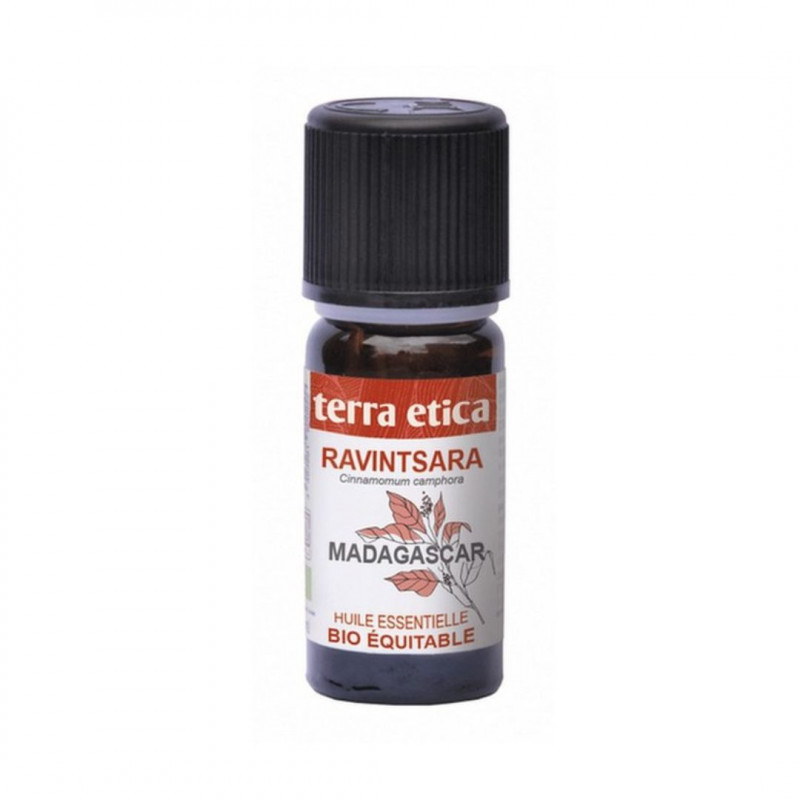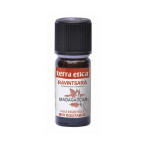terra etica Bio esenciálny olej Ravintsara z Madagaskaru, 10 ml
- Výrobca: terra etica
- Kód produktu: terraetica04
- Dostupnosť: Skladom
2 alebo viac -4%
Zaobstarajte si do domácej lekárničky tento silne protiinfekčný, antibakteriálny a antivírusový bio esenciálny olej Ravintsara z Madagaskaru!
Je ideálny na boj proti širokému spektru infekcií.
Ravintsara olej posilňuje imunitu, má antimikrobiálne, antialergické a antiseptické účinky. Má antireumatické, protikŕčové, mukolytické a stimulačné terapeutické vlastnosti. Pôsobí expektoračne, dekongestantne a antikatarálne, čo znamená, že pomáha pri angíne, bronchitíde a sinusitíde.
Antibakteriálny a antivírusový olej Ravensara pomáha chrániť povrchy pred škodlivými nánosmi medzi hĺbkovým čistením. Pridajte niekoľko kvapiek do rozprašovacej fľaše naplnenej vodou, dobre pretrepte a podľa potreby nastriekajte na tvrdé povrchy v kuchyni a jedálenských priestoroch.
Tradičné presvedčenie hovorí, že Ravintsara môže byť tiež použitá na odstránenie urieknutia a stimuláciu ducha pozitívnym spôsobom.
Esenciálneho olej Ravintsara sa používa aj na vlasy na vyrovnávanie pH pokožky hlavy, kontrolu nadbytočnej produkcie mazu (kožného mazu), liečbu a prevenciu lupín, ekzémov a psoriázy a posilnenie vlasov pri korienkoch.
Detailný popis produktu
Prírodný, 100% čistý, fair trade a bio esenciálny olej Ravintsara prvotriednej kvality šetrne destilovaný nízkotlakou vodnou parou z listov gáfrovníka lekárskeho priamo jeho pestovateľovi vo vlastnej dielni na severnom pobreží Madagaskaru. Už 542 rodín roľníkov združených v kooperatíve Fanohana produkuje a vyváža svoje kvalitné produkty nezávisle a nepredáva ich za nízke ceny miestnym priekupníkom. Fanohana je však výnimočná aj v inom ohľade – je prvou a zatiaľ jedinou organizáciou na svete, ktorá pestuje bio a fair trade liči. Liči, ananás a korenie sú základnými plodinami madagaskarskej ekonomiky, ako aj hlavnými produktmi družstva. Vďaka fair trade mohli vybudovať vlastnú remeselnú destilačnú dielňu, v ktorej vyrába esenciálne oleje z klinčekov, kurkumy, Niaouli a Ravintsara.
Veľmi kvalitný bio éterický olej Ravintsara z gáfrovníka lekárskeho, nazývaného aj škoricovník gáfrový (Cinnamomum camphora) s chemotypom 1,8-cinéole (50-60 %), sabinene (10-18 %), alpha-terpineol (5-11 %). Esenciálny olej je taký tajomný svet, duša či esencia rastliny. Duch a sila gáfrovníka sú v aromaterapii známe najmä pre svoje antivírusové a antimikrobiálne účinky. Esenciálny olej Ravintsara je skvelý na podporu zdravého dýchacieho a imunitného systému, pôsobí ako prevencia vírusových ochorení a pomáha pri ich liečbe. Špecificky vraj pôsobí na neurotropické vírusy - opary, pásové opary či kiahne. Má uľaviť aj pri chrípke a prechladnutí, tlmiť kašeľ, uvoľniť upchatý nos a povzbudiť po chorobe.
Svieža, korenená vôňa Ravintsary podobná eukalyptu čistí a osviežuje vzduch, a posilňuje tak imunitu a pozitívny pohľad na svet. Stimuluje myseľ, zlepšuje sústredenie, dodáva energiu.
Dospelý gáfrovník je až 40 m vysoký, vždyzelený strom, ktorého drevo, listy aj kôra obsahujú gáfrovú silicu, z ktorej sa získava surový gáfor. Tradične sa používa drevo a korene stromov starých 50-60 rokov, alebo lístie z mladších stromov. V priemysle sa však častejšie používa gáfor technický, synteticky vyrábaný z terpentínového oleja z ihličnanov. Gáfor sa využíva najmä v lekárstve a parfumérii, upravený potom aj výrobe vanilkovej a mätovej arómy.
Prvé bio a fair trade esenciálne oleje
Predstavujeme týmto zástupcov pravdepodobne vôbec prvý rad esenciálnych olejov na svete s certifikáciou ekologického poľnohospodárstva, ktoré sú kompletne vyrábané podľa princípov fair trade priamo v mieste pôvodu použitých rastlín. Pestovanie a zber aromatických a liečivých rastlín vychádza z tradície predkov a sú spojené so znalosťami, know-how a rešpektom k miestnemu ekosystému. Tí, ktorí tieto rastliny pestujú, ale mávajú vo výrobnom procese vedľajšiu úlohu, sú zle oceňovaní a samotnú destiláciu pestovatelia vykonávajú len veľmi zriedka.
Kooperatívny projekt Terra Etica francúzskej spoločnosti Ethiquable však práve s týmito výrobcami vytvára fair trade projekty s férovými cenami, dlhodobým záväzkom a zárukou pôvodu. To okrem iného umožňuje výrobcom zlepšiť svoje odmeňovanie a znovu zaviesť odrody rastlín, ktoré už vymizli. Práve tento férový prístup umožnil vybudovať na Madagaskare dve nové remeselné destilačné dielne, ktoré ponúkajú zamestnanie, pridanú hodnotu a vyššiu kvalifikáciu pre domorodé obyvateľstvo.
Bezchemické hospodárenie - esenciálne oleje vznikajú procesom koncentrácie účinných látok. Je preto veľmi dôležité, aby vstupná surovina bola bez syntetických chemických hnojív a pesticídov alebo znečisťujúcich látok usadených na rastline. Inak sa aj tieto látky škodlivé pre životné prostredie a naše zdravie môžu koncentrovať vo fľaštičke.
Destilácia éterických olejov vykonávaná v srdci družstiev malých výrobcov sa vykonáva lisovaním za studena alebo parou pod nízkym tlakom, čo umožňuje extrahovať všetky aromatické látky rastliny. Potom sa vo Francúzsku balia do farebných fľaštičiek, ktoré obmedzujú prienik svetla, a zabraňujú tak oxidácii, ktorá by znížila kvalitu oleja.
Bio esenciálny olej z fair trade projektu RCCE
 Družstvo Fanohana vzniklo v roku 2009 z iniciatívy 4 základných družstiev aktívnych od 90. rokov s cieľom zlepšiť životné podmienky produkcií liči, vanilky, korenia, škorice, zázvoru a ananásu. Spoločné dielo a fair trade prispieva k zlepšeniu životných podmienok členov, podporuje transparentnú správu spoločných statkov a vďaka vzdelávaniu a podpore zvonku posilňuje ochranu miestneho životného prostredia. Podľa hesla organizácie "vokatra tsara mahazo vola", teda v preklade "kvalitný produkt, pridaná hodnota" miestni pred časom zahájili aj výrobu výrobu esenciálnych olejov v bio kvalite vo vlastnej dielni.
Družstvo Fanohana vzniklo v roku 2009 z iniciatívy 4 základných družstiev aktívnych od 90. rokov s cieľom zlepšiť životné podmienky produkcií liči, vanilky, korenia, škorice, zázvoru a ananásu. Spoločné dielo a fair trade prispieva k zlepšeniu životných podmienok členov, podporuje transparentnú správu spoločných statkov a vďaka vzdelávaniu a podpore zvonku posilňuje ochranu miestneho životného prostredia. Podľa hesla organizácie "vokatra tsara mahazo vola", teda v preklade "kvalitný produkt, pridaná hodnota" miestni pred časom zahájili aj výrobu výrobu esenciálnych olejov v bio kvalite vo vlastnej dielni.
Už skôr sa však na východnom pobreží ostrova formovali prvé akcie, na ktorých sa spoločne podieľalo viac družstiev pôsobiacich v regióne Atsinanana v duchu hnutia fair trade. Následné vzdelávacie workshopy a reflexie skúseností viedli v roku 2018 k formálnemu vytvoreniu únie RCCE (Réseau des Coopératives du Commerce Équitable), ktorú tvorí 5 miestnych kooperatív zapojených do spravodlivého obchodu v regiónoch Atsinanana a Analanjirofo na východnom pobreží Madagaskaru. Dnes jej tvorí takmer 1700 členov, ktorí sa venujú produkcii korenia, trstinového cukru, ovocia, éterických olejov a výrobe ručne vyrábaných výrobkov.
Čo je esenciálny olej
S trochou zveličenia môžeme povedať, že esenciálny olej je tekutá forma rastliny. Esenciálne či tiež éterické oleje, prípadne silice či oleá aetherea sú olejovité zmesi vonných látok získaných z kvetov, semienok, listov a ďalších častí rastlín. Silice sú silne vonné, prchavé, vo vode nerozpustné látky, ktoré tvoria rastliny v rámci sekundárneho metabolizmu napríklad na ochranu pred bylinožravcami či prilákanie opeľovačov. Ide teda o prirodzene sa vyskytujúce prírodné látky s mnohými prospešnými vlastnosťami.
Označenie „silice“ pochádza z chemického odborného termínu „Geist“, ktorý Thámov slovník z r. 1788 prekladá českým „duch, sila“ v zmysle „prchavej esencie“ („spiritus“). Po stránke slovotvornej je tvorené príponou -ice od základu sila a vzniklo ako novočeský výraz na začiatku 19. storočia.
Esenciálne oleje sa využívajú najmä v aromaterapii, starom a dlhom odvetví alternatívnej medicíny pre krásu a zdravie, v ktorom sa používa skoro všetko, čo vonia. Aromaterapia je založená na čuchu, a voňavé éterické oleje tak s úspechom využíva na zmiernenie ľudského nepohodlia.
Dôležitý chemotyp
Rastlina dokáže vytvárať silice rôzneho zloženia, ktoré teda majú rozdielne účinky, použitie aj kontraindikácie. Pojem chemotyp hovorí, o aký typ esenciálneho oleja ide z chemického pohľadu. Teda ktorá látka či látky ho chemicky definujú a aké účinky teda od oleja môžeme očakávať. Určuje sa laboratórnou analýzou a potvrdzuje prítomnosť terapeuticky významnej molekuly v správnom množstve.
Na základe chemotypu tak dokážeme ľahko určiť vhodné použitie esenciálneho oleja aj éterické oleje porovnať medzi sebou. Aj preto chemotyp u našich olejov uvádzame, pretože ide o istú záruku kvality a skutočných terapeutických účinkov. Nie každý esenciálny olej je totiž pravý, nieto ešte kvalitný.
Návod na použitie:
Neprekračujte odporúčanú dennú dávku 0,10 ml = asi 2 kvapky. Nepoužívajte dlhšie ako 14 dní v kuse.
Neprehĺtajte čistý esenciálny olej, nenalievajte ho ani priamo do nápojov či vody na pitie. Nie je vhodný v tehotenstve, pri dojčení a pre deti do 6 rokov.
Nepoužívajte neriedené na pokožku a vždy chráňte oči. Po aplikácii riedeného oleja na pokožku sa vyhnite slnečnému žiareniu.
Vnútorné použitie nie je podľa slovenskej legislatívy možné. Podľa francúzskej, kde je výrobok certifikovaný a balený, je možné naniesť kvapku esenciálneho oleja na kúsok cukru, alebo ju zmiešať s lyžičkou medu či rastlinného oleja.
Nedá sa používať ako náhrada pestrej a vyváženej stravy a zdravého životného štýlu.
Uchovávajte mimo dosahu detí, svetla a tepla.
- Inhalácia - pridajte do aromalampy, difuzéra či inhalačné tyčinky alebo naneste na vreckovku a vdychujte.
- Kúpeľ - rozmiešajte pár kvapiek v rastlinnom oleji, mede či mlieku a pridajte do kúpeľa.
- Masáž - telový olej vyrobíte vmiešaním esenciálneho oleja do kvalitného rastlinného oleja.
| Objem | 10 ml |
| Teritórium | Madagaskar |
| Odroda | Cinnamomum camphora |
| Druh poľnohospodárstva | organické roľnícke poľnohospodárstvo |
| Extrahovaná časť rastliny | list |
| Chemotyp | 1,8-cineol, sabinén, alfa-terpinén |
| Spôsob extrakcie | vodná para pod nízkym tlakom |
| Doplnkové informácie | |
| Expirácia | 8.3.2025 |











